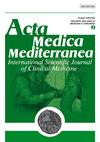Exploring the Distribution and Prognostic Effect of the ABO Blood Types of COVID-19 Patients During Delta and Omicron Waves: A Case Control Study
IF 0.3
4区 医学
Q4 Medicine
引用次数: 0
Abstract
Objective: We aimed to delineate the effects of the ABO groups and the main clinical outcomes with the current SARS-CoV-2 variants, i.e., delta and omicron. Materials and Methods: In this retrospective case-control study, the total 360 adult COVID-19 patients who were followed in the pandemic waves of delta and omicron variants and had ABO blood group analysis were included and divided into two groups according to the waves of variant. Demographic characteristics, comorbidities, length of hospitalization and intensive care needs, survival and ABO groups of cases were recorded. These groups were then compared with the ABO group distribution of population-reflecting 1881 healthy individuals and 186 historical alpha variant cases. Results: The demographic characteristics of the case groups and control group were similar. ABO distributions of the delta and omicron wave groups compared to the control group did not show a statistically significant difference. While advanced age (p<0.001) and presence of comorbidity (p=0.006) showed statistically significant differences in terms of overall survival, ABO blood group was not found to be a risk factor for mortality (p=0.114 in delta, and 0.526 in omicron), hospitalization time (p=0.148 in delta, p=0.224 in omicron), and intensive care unit admission (p=0.096 in delta, p=0.229 in omicron). Conclusion: The risk of infection among ABO blood groups, which has been shown in previous studies for the alpha variant against group A and in favor of group O, does not appear to be valid for delta and omicron period patients. Therefore, the anti-infective measures, especially vaccination, should not differ for individuals according to ABO blood group.探索新冠肺炎患者ABO血型在Delta波和Omicron波中的分布及其对预后的影响:一项病例对照研究
目的:我们旨在描述ABO血型和当前SARS-CoV-2变体(即δ型和组粒型)的主要临床结局的影响。材料与方法:本回顾性病例对照研究纳入360例在delta型和omicron型变异流行波中随访并进行ABO血型分析的成年COVID-19患者,根据变异波分为两组。记录病例的人口统计学特征、合并症、住院时间和重症监护需求、生存和ABO血型。然后将这些人群与反映1881名健康个体和186名历史α变异病例的人群ABO组分布进行比较。结果:病例组与对照组人口学特征相似。δ波组和欧米波组ABO分布与对照组比较,差异无统计学意义。虽然高龄(p<0.001)和共病的存在(p=0.006)在总生存率方面有统计学意义,但ABO血型并不是死亡率(delta组p=0.114, omicron组p= 0.526)、住院时间(delta组p=0.148, omicron组p=0.224)和重症监护病房入住(delta组p=0.096, omicron组p=0.229)的危险因素。结论:ABO血型之间的感染风险,在以前的研究中已经表明α变异对A组有利,而对O组有利,但对于delta期和ommicron期患者似乎并不有效。因此,抗感染措施,特别是疫苗接种,不应因ABO血型不同而有差异。
本文章由计算机程序翻译,如有差异,请以英文原文为准。
求助全文
约1分钟内获得全文
求助全文
来源期刊

Acta Medica Mediterranea
医学-医学:内科
自引率
0.00%
发文量
0
审稿时长
6-12 weeks
期刊介绍:
Acta Medica Mediterranea is an indipendent, international, English-language, peer-reviewed journal, online and open-access, designed for internists and phisicians.
The journal publishes a variety of manuscript types, including review articles, original research, case reports and letters to the editor.
 求助内容:
求助内容: 应助结果提醒方式:
应助结果提醒方式:


